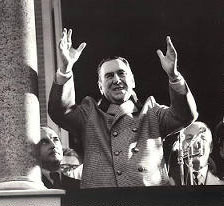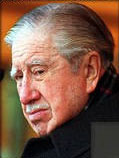REQUIRED
-
Howard Wiarda, "Historical Determinants of the
Latin American State," in Menno Vellinga, ed., The Changing Role
of the State in Latin America (Boulder, CO: Westview, 1998),
p. 27-49.
-
Dietrich Rueschemeyer, Evelyne Huber Stephens,
and John D. Stephens, Capitalist Development and Democracy
(Chicago: University of Chicago Press, 1992), p. 155-225.
-
The Economist, "Two cheers for democracy,"
Oct 26, 1996, p. 52.
-
Michael Shifter, "Tensions and trade-offs in Latin
America," Journal of Democracy, April 1997, 8 (2):114-28.
-
Ian Katz, "Will a new breed of strongman undermine
Latin democracy?" Business Week, May 18, 1998, p. 61.
-
The Economist, "Yes, we have no mananas,"
November 13, 1993, L5.
-
The Economist, "Commitment,
competence and consensus," November 13, 1993, L12.
-
Inter-American Development Bank, "Latin America
after a Decade of Reforms," Economic and Social Progress in Latin
America: 1998-99 Report (Johns Hopkins University Press, 1999),
p. 11-23.
-
Albert Berry, "Introduction," in Albert Berry,
ed., Poverty, economic reform & income distribution in Latin
America (Boulder, CO: Lynne Rienner, 1998), p. 1-5.
-
John Williamson, "Democracy and the 'Washington
Consensus,'" World Development, August 1993, 21 (8):1329-36.
- John Williamson, "Are the Latin American reforms
sustainable?" and Berhard Fischer, "Comment" in Hermann Sautter and
Rolf Schinke, eds., Stabilization and reforms in Latin America:
Where do we stand? (Madrid: Iberoamericana, 1996), p. 247-60.
RECOMMENDED
-
Jorge I. Dominguez, "Free politics and free markets
in Latin America," Journal of Democracy, October 1998, 9
(4):70-84.
-
Catherine M. Conahghan, "Polls, Political Discourse,
and the Public Sphere: The Spin on Peru's Fuji-Golpe," in Peter
H. Smith, ed., Latin America in Comparative Perspective: New
Approaches to Methods and Analysis (Boulder, CO: Westview, 1995):227-55.
-
D. J. Myers and R. E. O'Connor, "Support for Coups
in Democratic Political Culture: A Venezuelan Exploration," Comparative
Politics, January 1998, 30 (2):193-208.
-
Jennifer McCoy, "Chávez and the End of 'Partyarchy'
in Venezuela," Journal of Democracy, July 1999, 10 (3): 64-77.
-
Steven Haber, "Assessing the Obstacles to Industrialization:
The Mexican Economy, 1830-1940," Journal of Latin American Studies,
February 1992, 24 (1):1-32.
-
Mario Vargas Llosa, "Forward" in Hernando de Soto,
The Other Path: The Invisible Revolution in the Third World
(New York: Harper & Row, 1989), p. xi-xx.
-
Ruth Berins Collier and David Collier, Shaping
the political arena: critical junctures, the labor movement, and
regime dynamics in Latin America (Princeton: Princeton University
Press, c1991).
-
Luiz Carlos Bresser Pereira, "Economic Reform and
Cycles of State Intervention," World Development, 1993, 21
(8):1337-53.
-
Jorge Castaneda, Utopia Unarmed (New York:
Knopf, 1993).
-
Gustavo Gorriti, "Comentary on Utopia Unarmed.
Beyond the Epics of Failure: The Post-Utopian Left," Journal
of Inter-American Studies and World Affairs, Spring 1994, 36
(1):157-76.
- Frederick C. Turner, "Reassessing Political Culture,"
in Peter H. Smith, ed., Latin America in Comparative Perspective:
New Approaches to Methods and Analysis (Boulder, CO: Westview,
1995):195-224.
LITERARY OVERLAY
- Isabel Allende, The House of the Spirits
(New York: A. A. Knopf, 1985). [Or movie version.]
|

Juan Peron of Argentina

Augusto Pinochet, former dictator of
Chile
|
![]()
![]()
![]()
![]()
![]()